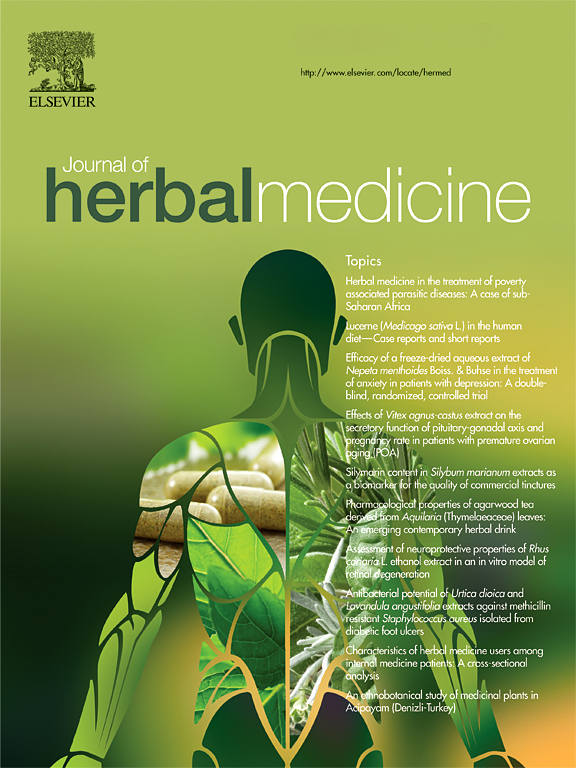生姜对减少剖腹产患者椎管穿刺后颤抖的疗效:随机临床试验
IF 1.9
4区 医学
Q2 INTEGRATIVE & COMPLEMENTARY MEDICINE
引用次数: 0
摘要
导言术后哆嗦是脊柱穿刺常见且令人不快的并发症。目前已研究出多种药物和非药物方法来控制颤抖。本研究旨在评估生姜治疗剖宫产患者脊柱穿刺后颤抖的效果。共有 242 名符合条件的参与者被随机分配到生姜栓剂组或安慰剂栓剂组。手术后立即使用栓剂。在干预后的六个时间点(20、35、50、65、80 和 95 分钟)记录两组参与者的颤抖评分。结果显示,两组在 20、35、50、65 和 80 分钟的平均颤抖评分有显著差异(P <0.05),90 分钟无显著差异。六个时间点的变化趋势表明,随着时间的推移,两组患者的颤抖强度存在明显差异(P < 0.001)。结论生姜栓剂可减少剖宫产(CS)患者脊柱穿刺后的颤抖。由于生姜栓剂无副作用且成本较低,可作为治疗剖宫产术后颤抖的一种选择。本文章由计算机程序翻译,如有差异,请以英文原文为准。
The efficacy of ginger in reducing post-spinal puncture shivering in cesarean section patients: a randomised clinical trial
Introduction
Postoperative shivering is a common and unpleasant complication of spinal puncture. Various pharmacologic and non-pharmacologic options have been studied to control shivering. This study aimed to evaluate the effectiveness of ginger in treating post-spinal puncture shivering in patients undergoing cesarean section.
Methods
A placebo-controlled, single-blinded, randomised controlled trial was conducted. A total of 242 eligible participants were assigned to the ginger or placebo suppository groups using block randomisation. Suppositories were administered immediately after the operation. The shivering scores were recorded for both groups at six time points (20, 35, 50, 65, 80, and 95 minutes) after the intervention. The participants' shivering scores were analysed using a repeated-measures analysis of variance (ANOVA) test.
Results
The results showed significant differences between the two groups in the mean shivering scores at 20, 35, 50, 65, and 80 minutes (P < 0.05), with no significant difference at 90 minutes. The trend of changes at six time points demonstrated that shivering intensity significantly differed between the two groups over time (P < 0.001). No significant side effects were observed in patients in the two groups.
Conclusion
Ginger suppository reduces shivering after spinal puncture in patients undergoing cesarean section (CS). Due to the lack of side effects and lower cost of ginger suppositories, it can be considered as an option for post-CS shivering.
求助全文
通过发布文献求助,成功后即可免费获取论文全文。
去求助
来源期刊

Journal of Herbal Medicine
INTEGRATIVE & COMPLEMENTARY MEDICINE-
CiteScore
3.90
自引率
0.00%
发文量
94
期刊介绍:
The Journal of Herbal Medicine, the official journal of the National Institute of Medical Herbalists, is a peer reviewed journal which aims to serve its readers as an authoritative resource on the profession and practice of herbal medicine. The content areas of the journal reflect the interests of Medical Herbalists and other health professionals interested in the clinical and professional application of botanical medicines. The objective is to strengthen the research and educational base of herbal medicine with research papers in the form of case studies, original research articles and reviews, monographs, clinical trials and relevant in vitro studies. It also publishes policy statements, opinion pieces, book reviews, conference proceedings and profession related information such as pharmacovigilance reports providing an information source for not only the Herbal Practitioner but any Health professional with an interest in phytotherapy.
 求助内容:
求助内容: 应助结果提醒方式:
应助结果提醒方式:


